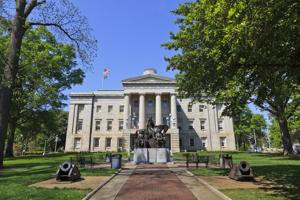House budget proposal includes historic spending for North Carolina

(The Center Square) – The North Carolina House rolled out its spending plan Monday for the current fiscal year and the next, including an historic amount in capital project spending, a tax cut for North Carolinians and bonuses and raises for state employees.
The tax provisions in the House version of the budget are broader than in the Senate plan for the biennium.
It includes five tax bills that have been passed previously by the House. Fiscal analysts estimated the proposal could reduce state revenue by more than $8.4 billion over the next five years.
The House proposal would reduce the personal income tax rate from 5.25% to 4.99% and the corporate tax rate from 2.5% to 2.25% in 2024 and to 1.99% going forward. The Senate proposal gradually eliminates the corporate tax and reduces the personal income tax rate to 3.99%. Both proposals, however, eliminate the North Carolina property bases from franchise tax calculation.
House Committee on Finance Chair Rep. John Szoka, R-Cumberland, said the House proposal will give North Carolina one of the lowest corporate tax rates in the southeast.
“When you look at competition between states, you first have to look at it regional competition,” Szoka said.
The measure includes many provisions that are not in the Senate plan, including permanently expanding tax credits for rehabilitation projects. It would exempt sales tax for Continuing Care Retirement Communities and personal property taxes for vaccines held by private medical practices. It also eliminates taxes on military pensions.
House leaders also touted the number of capital projects that would be funded under the measure while reducing debt.
The proposal would invest $18 billion over the next 10 years, while reducing state debt by 83%, lawmakers said. The funding would be used for school construction and many of the state’s longstanding infrastructure needs. The Senate spending plan for the next two fiscal years established a 10-year, $12 billion cash infrastructure and capital plan.
“I don’t think we ever spent this much on capital in the history of the state,” House Speaker Tim Moore, R-Cleveland, said Tuesday during a new briefing.
House leaders also said the proposal includes a historic amount of disaster relief and preparation spending. It includes $1 billion for disaster relief and flood mitigation. Lawmakers said taxpayers would save on the “back end.” For every dollar spent on pre-disaster mitigation in the proposal, taxpayers save $4 to $7 in disaster recovery funding.
House leaders targeted state bonuses and raises based on troubled areas of retention and recruitment, they said.
All state employees who worked during the pandemic will receive one-time $500 bonuses under the plan. Employees who earn less than $75,000 annually, law enforcement officers, corrections and juvenile justice officers, high school principals and state frontline public health workers will get an additional $1,000. Workers who fall under the job criteria and make less than $40,000 will get an additional $500, meaning those workers can get bonuses of up to $2,000.
The maximum amount for state bonuses under the Senate plan is $1,800 for principals. Teachers are earmarked an additional $300 bonus on top of state worker bonuses in the Senate plan. Direct care workers would receive $1,500 under the Senate proposal, but the House proposal would provide $2,000 bonuses with federal funds.
Under the House proposal, most state employees would be given a 2.5% salary increase in pay each year of the biennium. Community college professors would get a 3.5% salary increase and other community college staff would receive 2% raises. Correction officers would receive up to 7% raises under the plan. It also would add $5 million to the University of North Carolina’s retention and recruitment fund.
The proposal also sets up a base salary schedule for judiciary employees and increases step raises for teachers who have worked more than 15 years. Teachers also would receive $300 bonuses left over from school assessment funding. Principals will be held harmless under the House plan and would receive an extra $100 under the proposal from the leftover testing funds. Educators and most state employees were earmarked a 3% pay increase under the Senate proposal.
The state would provide eight weeks of paid parental leave for the first time for public school employees and restore advanced degree supplements. Psychologists and school counselors would see an extra $1,000 a year on every step, and teachers no longer would have to pay $50 for a substitute on days when they take personal leave. Other school personnel would receive $13 per hour pay during the first fiscal year and $15 per hour pay during the second fiscal year, under the plan.
House appropriations committees will review the spending proposals Tuesday. A full House vote is expected on Wednesday.
Disclaimer: This content is distributed by The Center Square
